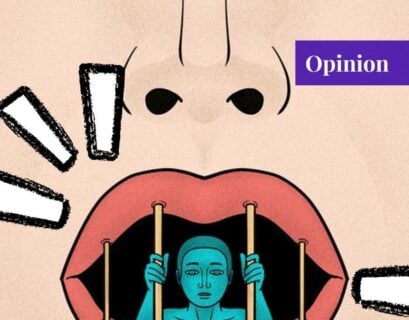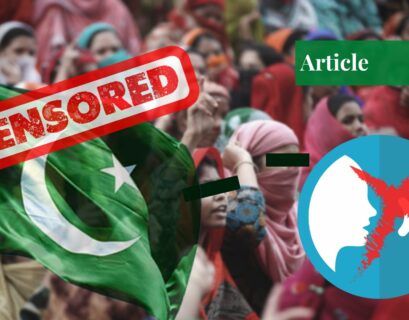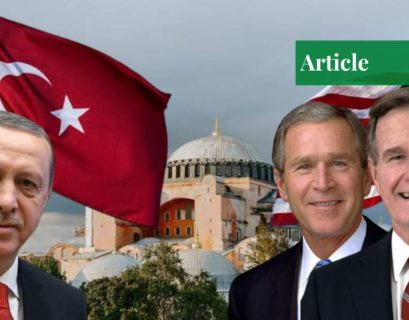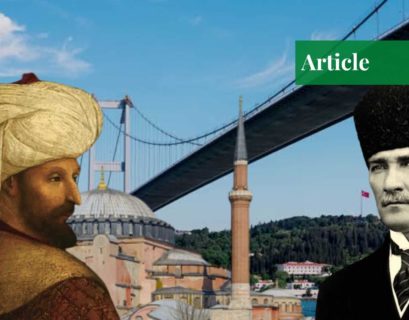Mr Kannan Solayappan has an undergraduate degree in Chemical Engineering and a Masters in Computer Science from Australia. He is the author of "Modernity, Civilizations and the Truth". Mr Kannan is also a Global Minnesota speaker on the Foreign Policy Association's Great Decision Program.
Introduction
What is the destiny of freedom? This is the question that all responsible people should ask. Yet, nobody asks it. Freedom in the world is not something that is static but rather dynamic. It has been constantly changing for the last two hundred years. What freedom makes possible now, was not possible centuries ago.
So, what will freedom be in the future? Where will it take us? Will the taboos of today be undone in the future or do we have nowhere further to go? If so, will we stagnate? These are the questions we need to explore. The answers we provide will have enormous consequences, not merely for American domestic and foreign policy, but for the future of humanity as well.
The most intractable problem that confronts Western civilization today is the destiny of freedom. Freedom has been the most cherished ideal in Western civilization for more than two hundred years. It has been the prime mover of Western history during this time, coinciding with the spread of modern life.
Freedom During Industrial, Technological and Medicinal Progression
Modern life is characterized by great advances in manufacturing, transportation, communication, and medicine. Mass manufacturing enabled large quantities of goods to be produced with great precision. Advances in transportation made travel and migration much easier and therefore, people did not have to be restricted to their place of birth.
Communication advances ensured that people can come to know of distant events with relative ease. Modern medicine has substantially increased the human life span. One of the consequences of all this is that it has increased both opportunity and mobility for humans. The call for freedom has resonated with increased opportunities and greater mobility.
Since machinery substituted human labor, there was no further need to possess slaves. Since modes of transportation were revolutionized, people, who until then were segregated, came into contact with each other more frequently. It was no longer physically possible to segregate people. As the apartheid government in South Africa eventually found out – it was very difficult to operate a modern economy in a racially segregated society.
Likewise, European colonial powers could not cherish freedom as an ideal in their domestic discourse and denied the very same freedom to their overseas subjects. Furthermore, these European colonial powers lacked the resources to keep restive populations perpetually under their control.
Therefore, freedom for slaves, freedom for women, and freedom for colonized people were all, in time, generally welcome as being progressive. Advocacy for freedom was in a sense advocacy for the inevitable.
Freedom: How Far Will it Go?
In time, this quest for freedom has acquired a life of its own. Freedom, besides being a source of good, has also displayed its negative effects. Drug abuse, teen pregnancy, and the disintegration of family units have been some of the most pernicious effects of unabated freedom in Western civilization.
In addition, free societies also promote rampant consumerism. Besides, in a world where there are enormous inequities, and rapidly depleting finite natural resources, excessive consumerism is morally wrong. As a result, one thing is becoming certain and that is freedom can no longer be regarded as entirely a virtue, which once facilitated the transition to modernity.
There is an even greater problem with the onward march of freedom and that pertains to its destiny. Where will this quest for freedom end? Is nudity in public an expression of freedom? Today, it is legal to use marijuana not merely for medical purposes but also for pleasure. Will the consumption of other more potent drugs for pleasure also be legalized?
Already Libertarians in America are making a case for unrestrained legal availability of all drugs. In many Western countries, including the United States, gay and lesbian marriages are legal. Will a case be made someday to legalize incestuous relationships as well? Some feminists have argued that women are socialized to be women. They suggest that there is nothing innate in women that makes them behave like women.
A similar argument can be made someday in the future, where one could argue that we are merely socialized to conform to incestuous taboos. In the run-up to gaining public acceptance for homosexuality, endearing letters, written by American President Abraham Lincoln to his male friends, were shown as evidence of the prevalence of homosexual tendencies in previous eras.
Now, how much more ammunition will those who someday may seek to legitimize incestuous relationships have? Will not every act of natural affection from parents towards their children and between siblings, be considered suspicious? Human civilization has existed for over five thousand years, in most places and most times, without democracy and with much less freedom.
Can human society function for even a single day, if a brother and sister can marry each other or if parent and child can marry each other?
Economic Woes or Cultural Issues: Which Matters More?
The destiny of freedom is a difficult and seemingly intractable question to consider. Therefore, there is a tendency to put it off. The subjects that societies choose to consider in the public sphere must be the ones that are likely to have the greatest impact on them. The more profound the impact of an issue, the more urgent must its public consideration is.
If a society merely considers only easy questions, it is then quite possible that it might miss the most pertinent questions and be lulled into believing that all is well, when it is not. Avoiding difficult questions is an irresponsible course. At least when we engage with difficult questions we have the possibility of arriving at answers.
However, if we don’t engage at all, we will be doomed when these questions become realities. Alternately, the case may be made that a society ought to be pragmatic and consider only issues that have practical relevance. The destiny of freedom may be viewed as an esoteric question which only selected people, like philosophers, should worry about.
Indeed the destiny of freedom was the domain of philosophers. Nietzsche was concerned about the destiny of freedom centuries ago. These problems, which are a consequence of unrestricted freedom like the disintegration of the family, teen pregnancy, and drug abuse, are social problems experienced by people here and now.
Another point of view that is advanced is that more urgent priorities like debt, deficit, and unemployment must take precedence over cultural issues, which tend to distract our public conversation. Unemployment is certainly an issue that requires immediate redress, but in almost all the developed countries of the West, there is some form of unemployment assistance that is available as a buffer.
The impact of debt and deficit, for all their harmful effects, are experienced by society only with the passage of time and not at the moment of borrowing or spending. Cultural issues, arising from the malevolent effects of the progress of freedom, would easily be more devastating than the harmful effects of the debt or the deficit. Economic woes like debt or deficit will at best bankrupt a nation, destroy its credibility, and leave its citizens impoverished.
Many nations in history have been impoverished. In our current times, we see quite a few third-world nations that are impoverished. Their citizens are living in abject poverty, but we cannot conceive of a single nation in the world that can function with legitimized incestuous relationships.
The Unignorable Destiny of Freedom
Are those who express concern over the destiny of freedom, fear mongers, who simply seek to stir people up about possibilities that may never become a reality? Based on past experiences we cannot make such assumptions. A hundred years ago most people would never have thought that pre-marital sex would be socially acceptable and yet, it is the norm in Western civilization today.
Towards the end of the Second World War, gay marriages would have been unthinkable. Today, homosexual marriage is legal in some nations; almost all these nations have been predominantly Christian and most of them are Western. What is to stop notions that are obscene to us today, like incestuous marriage or public nudity, from becoming a reality tomorrow?
Or would Western civilization treat them as an expression of multiculturalism and seek to legitimize it? If so then the one value – multiculturalism, which has worked well in Western civilization in the last twenty-five years – has the prospect of becoming profoundly stained. One could acknowledge the ugly destiny that is in store for the historical advancement of freedom but may choose to cross the bridge when the time comes, rather than worry about it now.
This would be an extremely irresponsible course. Before a business venture is founded, a business plan is created. The founding fathers of the United States stated that all men were created equal in the Declaration of Independence, even though slavery was practised in the United States at that time.
Though the political circumstances at the time did not permit the abolition of slavery, they were hoping that slavery would eventually be completely eradicated in the United States. In other words, they had some conception of the future when the United States became independent. In so far as the destiny of freedom is concerned, we are grappling with issues that may arise as a result of an ongoing historical process.
If we postpone judgment now, we would be willfully facilitating the realization of the ugly consequences of the advancement of freedom. The idea of freedom is so central to both Western histories and to our conception of modernity at the present time that we cannot and must not avoid considering any malevolent impact that it may have in the future.
The Root Cause: Secularism, Not Christianity
Christianity had its roots in the Middle East. The cultural origin of Christianity was Jewish. Paul broke Christianity’s cultural link with ancient Judaism. Pauline Christianity, when it went to Europe, destroyed the Greco-Roman culture it found there instead of replacing it with Jewish culture. So much so, to this day, the cultural origin of Christendom is not discernible either as Jewish or as Greco-Roman.
Nor can we say that it is a fusion between the two cultures. Indeed the culture of Christian Europe merely had a few residual elements from Jewish and Greco-Roman cultures. When modern liberal ideas spread in Western civilization, they did not have an organically evolved cultural core to contend with. In addition to that, liberal ideas were intrinsic to Western civilization.
Over time, these liberal ideas were embraced by the general population with relatively less resistance. In other parts of the world, modern liberal ideas have largely been restricted to cities, and even in that, it is often restricted to sophisticated elites. Other cultures are delimited by their previous historical experience in accepting liberal Western ideas.
Besides, the other three major civilizational traditions – Indian, Confucian East Asian, and Islam – have an organically evolved cultural core that prohibits liberal ideas from penetrating their respective cultures. When modern civilizational scholars classify civilizations, we often find that Christendom has more representatives than any of the other three civilizations.
As an example, Samuel Huntington identified seven or eight civilizations of which three or four belonged to Christendom, namely Western, Orthodox, Latin America, and possibly Africa. One could say Africa is partially Christian and partially Islamic. The next highest was Confucian with just two representatives, China and Japan.
East Asian Confucian culture is five thousand years old, much older than Christendom, and therefore, must have had greater scope for variation within its ambit. It should have had more representatives in any civilizational classification. That however is not the case. The reason that Christendom has more representatives in civilizational classifications is that it is unified only in what it destroyed and not in what it created.
Civilizations have had substantial interactions with others. Some even imported religions from other civilizations. However, in none of them, except Christendom, did their population become altogether different people – almost completely different from their native or foreign cultures. China also imported Buddhism from India, but it did not allow Buddhism to destroy or replace Chinese culture.
China co-opted Buddhism with its culture essentially intact. Islam confronted and overcame a highly developed civilization in Iran. Even today, the civilizational identity of Iran is unmistakably Islamic, though a Persian substratum is discernible. Hindu Indian civilization is a product of two peoples, Aryan and Dravidian, adhering to two civilizations and speaking two different languages.
Yet, even after four thousand years of their interaction, in the twentieth century in the Southern Indian state of Tamilnadu, the Self-respect Movement was fairly successful in weeding out Aryan elements from Tamil culture. Freedom alone, without the absence of an organic civilizational core, would not have created the historical problems for the West that we have highlighted here.
India is a democracy and the different communities in India debate political, historical, and social issues passionately but that has not thrown Indian civilization into disarray, even though political and social life in India today are characterized by unprecedented communal divisiveness. Nor are the historical and social problems the West confronts, a consequence of development.
Japan is just as much of an advanced industrialized country, but it does not confront the profound historical dilemmas the West faces. So, what then, is the solution for the West’s historical dilemmas? We cannot suggest that the answer lies in medieval Christianity. Westerners did not leave medieval Christianity through religious conversion.
Had they left behind medieval Christianity through religious conversion at one previous moment, then we can suggest a return to Christianity, as a solution for their present historical dilemmas. They, however, left behind medieval Christianity, through historical evolution – by a slow process that was primarily facilitated by ideas of the European Enlightenment.
So, our thesis that there is something inherent in Western history that is responsible for the dilemmas of the West is a reasonable one. The West cannot take the civilizational matrix of another civilization. India and China are not aggressively proselytizing cultures; hitherto, their cultures have been embraced only by kindred people, who lived in geographical proximity to them.
However, Islam is a proselytizing religion and this has understandably created fears in the minds of Westerners. Will Muslims violently attempt to impose an Islamic cultural matrix on Westerners? If Muslims try to impose their religion forcibly on the West, it would certainly be wrong. There is no sanction for such a course in the Quran. Islam asks Muslims to fight a holy war, only to destroy evil.
Violent methods are not to be used to impose Islam on unwilling people. Indeed, even if Muslims launched such an effort it is not likely to succeed. Islam is a monotheistic religion in which believers worship the formless God. On the other hand, Westerners have all along been image worshipers.
Even though Christianity was founded in the Middle East and has a monotheistic narrative, Christians are generally tolerant of images, icons, frescoes, and paintings in their churches – a far cry from the strict abhorrence of images that characterizes Islam. In addition, Christendom has been systematically secularizing its culture over the last five hundred years.
The central issues of public discourse in Western civilization are entirely secular. The principal areas of public discourse revolve around the economy, national security, equality, and the politics of liberty. People today in the West are not concerned about whether God has a form or not. If people were primarily grappling with aspects of theology then the strict monotheism of Islam would have a certain appeal to them.
It is not possible to make large population centers embrace religions that are fundamentally in variance with their experience. However, there is nothing wrong with Muslims suggesting Islam as a solution for the West’s problems as long as there is no compulsion to convert.
Where Lies Western Civilization’s Salvation?
For Western civilization to protect itself from a horrific destiny that could descend on it, it needs a way of life. Constitutional democracy is a political system that is created to order political arrangements in a country, while capitalism is a way to organize economic life in society. Neither constitutional democracy nor capitalism constitutes a distinct way of life.
The West needs a civilization born anew. A civilization is not merely a set of arbitrary cultural practices; civilization is a spiritually integrated way of life. From a secular perspective, such a civilizational solution for the West seems intractable. A civilizational rebirth is most likely to be a religious phenomenon.
The coming of a new religion or a new way of life, historically, has been accompanied by great upheaval. At the least, America and the West must try to circumvent such upheaval. An alternate way of comprehending reality, that was known to the ancients, may be of assistance to the West now.
Using the rational principle, Socrates and Plato, concluded that goodness was the highest virtue. Early Christians believed that love was the highest virtue. Taoist held that the eternal Tao was unutterable simplicity. The pre-Vedic Indian perfect masters believed that God was everywhere. Though ancients across different lands used different terms, what they commonly valued was the collective well-being of all and especially the well-being of the helpless.
They also held that this pursuit of the collective wellbeing of all, especially of the downtrodden, was ultimately beneficial to those who pursued it. America can make this timeless wisdom its own and transcend the historical dilemma that it confronts. Today, outside the West and East Asian Confucian nations, most countries are not able to come to terms with the requirements of modernity.
The problem is dire in sub-Saharan Africa and in war-torn regions of the world. America can take up the cause of creating an equitable world order, as it is the last moral frontier that humanity needs to cross. For this, America and the West first need to be transformed from within. It must not consume any more than what it needs.
It must make available the surplus to Third World nations and the domestic poor. This money should not be given away to corrupt dictators as handouts. When the nobility of intent of America and the West becomes self-evident, Third World countries may even be willing to allow international institutions like the U.N. or even Western nations to run a service like an airline or specific government departments in their countries.
If this process deepens and goodwill exists on both sides, the developing nation can even entrust its governmental authority to the United Nations or to a developed country. This process can ultimately lead to the formation of a world government, under which all nations and all peoples are united.
Such an effort, if successful, is bound to be so ethically profound, that the West can expect to get a new way of life without substantial upheaval since truth, righteousness, goodness, and the collective wellbeing of all – especially of the helpless is potent, as the ancients in all lands have wisely foreseen.
Conclusion
In pondering over the destiny of freedom, we must not fail to note that the West’s cultural dilemmas are historical issues and not ethical issues. Conservatives, both from the East and West, tend to blame the liberal West for the social consequences of the advancement of freedom. This is not fair because the problem is not with the advancement of freedom, as it is with the absence of a way of life.
The absence of a way of life in the West, again, is a historical issue and not a moral one. One cannot blame Westerners for a historical aberration that happened nearly two thousand years ago. The absence of a way of life is not evil like hatred, war, prejudice, starvation, malice, or destitution.
If you want to submit your articles and/or research papers, please check the Submissions page.
The views and opinions expressed in this article/paper are the author’s own and do not necessarily reflect the editorial position of Paradigm Shift.



















